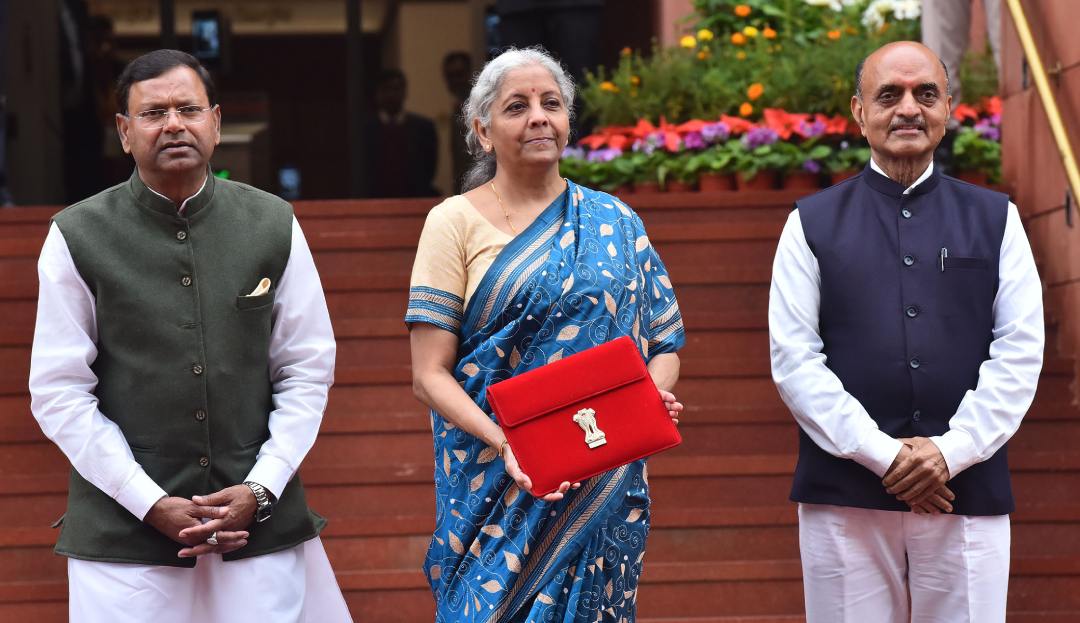Budget 2024: Nirmala Sitharaman Announces Greener Plans for India
The minister has committed substantial funds to enhance the green energy sector, emphasizing the utilization of solar power and India’s extensive offshore wind energy potential.
Commitment to meet ‘Net Zero’ by 2070
- Viability gap funding for wind energy
- Setting up of coal gasification and liquefaction capacity
- Phased mandatory blending of CNG, PNG and compressed biogas
- Financial assistance for procurement of biomass aggregation machinery
- Rooftop solarization- One crore households get up to 300 units of free electricity per month
- Adoption of e-buses for public transport network
- Strengthening the e-vehicle ecosystem by supporting manufacturing and charging
- New scheme of biomanufacturing and bio-foundry to be launched
In a strategic move towards a more sustainable future, Finance Minister Nirmala Sitharaman has presented a comprehensive plan in Budget 2024, aiming to achieve India’s ambitious Net Zero target by 2070. The minister has committed substantial funds to enhance the green energy sector, emphasizing the utilization of solar power and India’s extensive offshore wind energy potential.
During the announcement of the interim Budget 2024 on Thursday, Sitharaman stated, “Through rooftop solarisation, one crore households will have the opportunity to receive up to 300 units of free electricity monthly.” The anticipated benefits of “rooftop solarisation” include significant savings ranging from Rs. 15,000 to Rs. 18,000 for households through free solar electricity and the ability to sell surplus power to distribution companies.
Another noteworthy initiative involves providing viability gap funding for the development of 1 gigawatt (GW) of offshore wind energy. This initiative is expected to play a pivotal role in diversifying India’s renewable energy sources and reducing dependence on fossil fuels.
A crucial aspect of the strategy is the ambitious goal to establish coal gasification and liquefaction projects capable of processing 100 metric tonnes by 2030. This move aims to reduce India’s import reliance on natural gas, methanol, and ammonia, while simultaneously promoting cleaner energy alternatives.
In a bid to mitigate carbon emissions, the government plans to mandate the blending of biogas with compressed natural gas (CNG) for transportation and piped natural gas for domestic use. This policy is projected to enhance air quality and to stimulate the biogas industry, contributing to a circular economy.
Financial support will be extended to facilitate the procurement of biomass aggregation, a critical element for bioenergy production. This step is likely to encourage farmer participation in the bioenergy supply chain, creating a sustainable and profitable model for managing agricultural waste.
The EV Boost
The Electric Vehicle (EV) ecosystem is poised for a significant boost. The government aims to enhance manufacturing capabilities and charging infrastructure, anticipating a considerable uptick in EV adoption nationwide.
To encourage the widespread use of electric buses, the government is actively promoting their increased adoption. This move is designed to mitigate urban pollution and foster sustainable public transportation practices.
The interim budget also presents a scheme centred on biomanufacturing and biofoundry, emphasizing green growth and innovation in the biotechnology sector. The goal is to shift from the current consumptive manufacturing model to one based on regenerative principles, aligning with global sustainability trends.
Also Read
Will India Achieve It’s Target of 40 GW Rooftop Solar Under ‘Pradhanmantri Suryodaya Yojana’?



